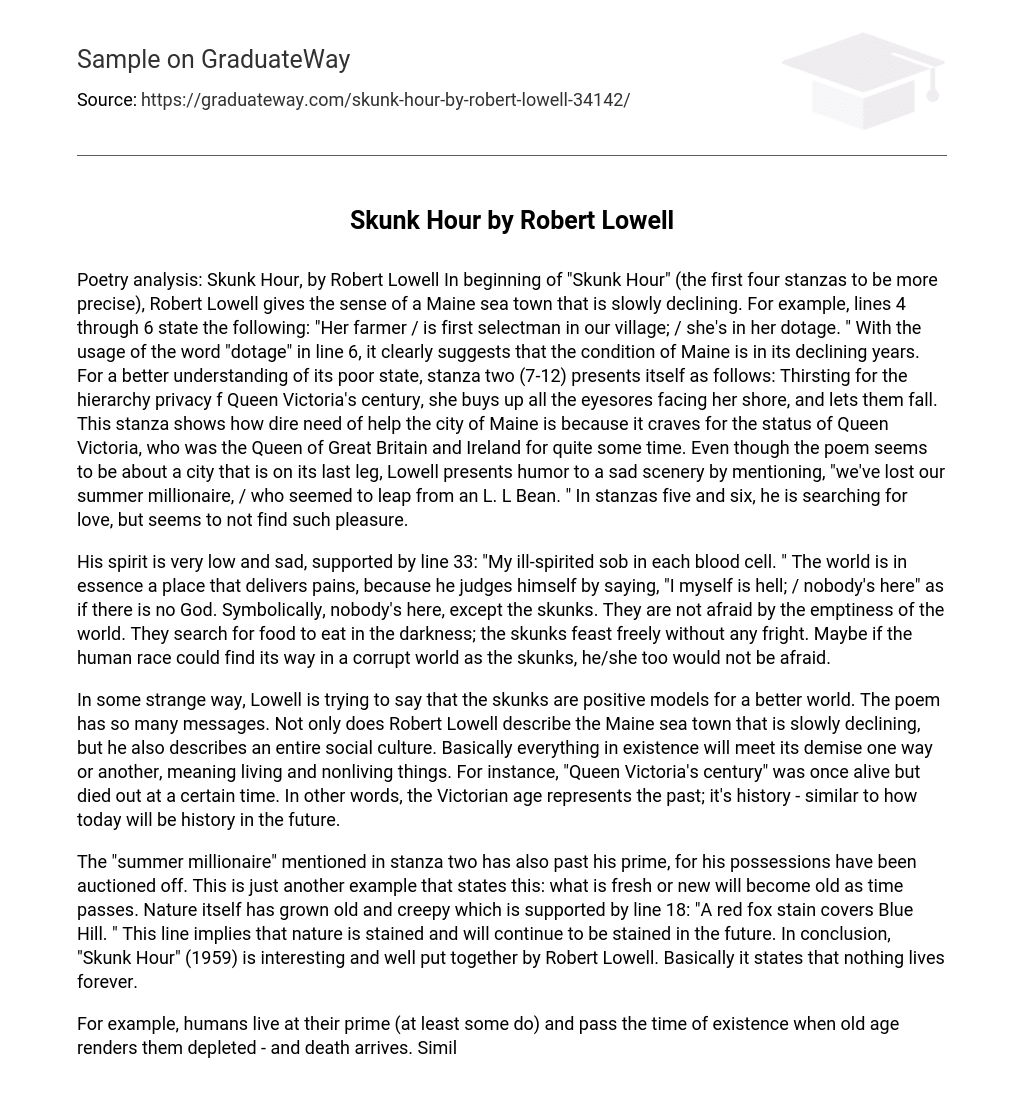Poetry analysis: Skunk Hour, by Robert Lowell In beginning of “Skunk Hour” (the first four stanzas to be more precise), Robert Lowell gives the sense of a Maine sea town that is slowly declining. For example, lines 4 through 6 state the following: “Her farmer / is first selectman in our village; / she’s in her dotage. ” With the usage of the word “dotage” in line 6, it clearly suggests that the condition of Maine is in its declining years. For a better understanding of its poor state, stanza two (7-12) presents itself as follows: Thirsting for the hierarchy privacy f Queen Victoria’s century, she buys up all the eyesores facing her shore, and lets them fall. This stanza shows how dire need of help the city of Maine is because it craves for the status of Queen Victoria, who was the Queen of Great Britain and Ireland for quite some time. Even though the poem seems to be about a city that is on its last leg, Lowell presents humor to a sad scenery by mentioning, “we’ve lost our summer millionaire, / who seemed to leap from an L. L Bean. ” In stanzas five and six, he is searching for love, but seems to not find such pleasure.
His spirit is very low and sad, supported by line 33: “My ill-spirited sob in each blood cell. ” The world is in essence a place that delivers pains, because he judges himself by saying, “I myself is hell; / nobody’s here” as if there is no God. Symbolically, nobody’s here, except the skunks. They are not afraid by the emptiness of the world. They search for food to eat in the darkness; the skunks feast freely without any fright. Maybe if the human race could find its way in a corrupt world as the skunks, he/she too would not be afraid.
In some strange way, Lowell is trying to say that the skunks are positive models for a better world. The poem has so many messages. Not only does Robert Lowell describe the Maine sea town that is slowly declining, but he also describes an entire social culture. Basically everything in existence will meet its demise one way or another, meaning living and nonliving things. For instance, “Queen Victoria’s century” was once alive but died out at a certain time. In other words, the Victorian age represents the past; it’s history – similar to how today will be history in the future.
The “summer millionaire” mentioned in stanza two has also past his prime, for his possessions have been auctioned off. This is just another example that states this: what is fresh or new will become old as time passes. Nature itself has grown old and creepy which is supported by line 18: “A red fox stain covers Blue Hill. ” This line implies that nature is stained and will continue to be stained in the future. In conclusion, “Skunk Hour” (1959) is interesting and well put together by Robert Lowell. Basically it states that nothing lives forever.
For example, humans live at their prime (at least some do) and pass the time of existence when old age renders them depleted – and death arrives. Similar to a nonliving thing like a building, it is built and as time passes, its stature declines with wear and tear until it is knocked down to the ground via implosion or bulldozers. The skunk analogy Robert Lowell uses is very profound, because it gives hope for a dying world in which humankind occupy – perhaps hope that could change the way humans view life in general, and better the living conditions. ny Robert





